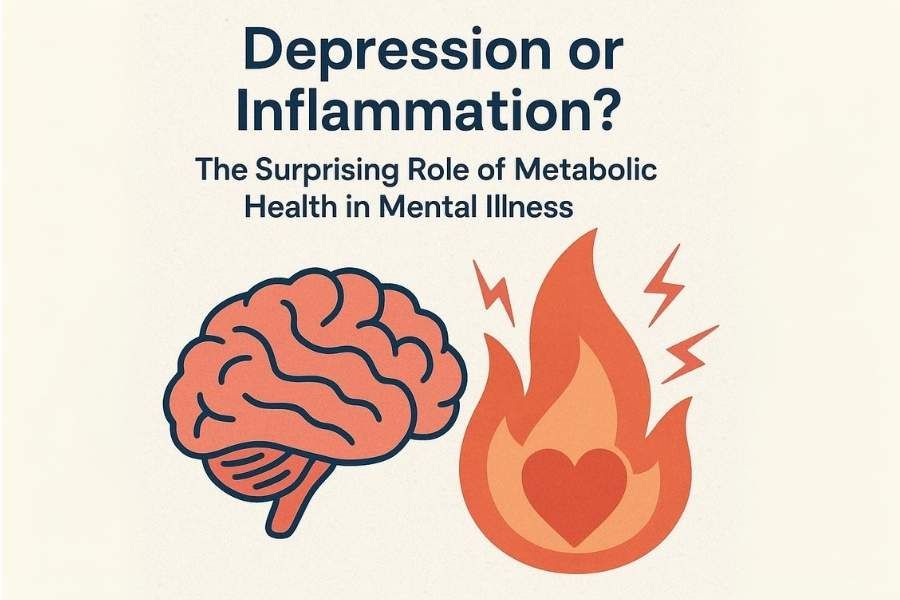What Your Blood Sugar Says About Your Mood
By Mehboob Ali Nazarani, M.D.
Published February 17, 2025 · Updated April 3, 2025 · Last reviewed February 17, 2025 · 3 min read · Depression
Have you ever felt "hangry"—that irritable, anxious, foggy feeling when you haven't eaten in a while? This simple experience provides a clue about a much deeper connection between your blood sugar levels and your mental health.
Understanding Blood Sugar and Mood
Blood sugar, or glucose, is the main energy source for your body and brain. When glucose levels swing too high or too low, it doesn't just affect your physical health—it profoundly impacts your mood, anxiety levels, and even cognitive abilities.
Insulin Resistance: A Hidden Cause of Mood Swings
Insulin resistance happens when your body's cells become less responsive to insulin, a hormone that regulates blood sugar. This causes higher-than-normal blood sugar levels, known as prediabetes.
Evidence shows that individuals with insulin resistance are more likely to experience depression, anxiety, and cognitive issues. Why? Insulin isn't just about sugar—it helps regulate neurotransmitters and inflammation in the brain, which are critical for stable mood and clear thinking.
Symptoms Your Blood Sugar Might Be Affecting Your Mood
- Frequent mood swings or irritability
- Feeling tired after meals or experiencing energy crashes
- Cravings for sweets or carbohydrates
- Brain fog or difficulty concentrating
- Anxiety or jitteriness without clear reasons
- Unexplained fatigue
How Blood Sugar Impacts Depression and Anxiety
Studies have found that individuals with consistently elevated blood sugar are more likely to develop depression. High blood sugar can create inflammation, disrupting neurotransmitter balance in the brain and leading to feelings of sadness, lethargy, and anxiety.
For example, individuals with higher fasting blood sugar are at greater risk of developing anxiety disorders. This connection underscores why maintaining stable blood sugar is crucial—not just for your physical health but your emotional well-being, too.
Practical Steps to Balance Your Blood Sugar and Mood
Here are actionable tips to improve your mood through better blood sugar control:
✅ Balance Your Meals
Include protein, healthy fats, and fiber-rich foods (like vegetables and whole grains) to stabilize blood sugar.
🏃 Regular Exercise
Physical activity improves insulin sensitivity, meaning your body handles blood sugar better—reducing mood swings and anxiety.
😴 Mind Your Sleep
Poor sleep can worsen insulin resistance. Aim for consistent, restful sleep each night.
🧘 Manage Stress
Chronic stress elevates cortisol, worsening insulin resistance. Techniques like mindfulness or yoga can help.
🩺 Ask Your Doctor
Regular screenings like fasting glucose, HbA1c, and fasting insulin tests can detect early insulin resistance.
Medications and Supplements to Consider
If lifestyle adjustments aren't enough, certain medications originally intended for diabetes can improve insulin sensitivity and have shown promising effects on mood and anxiety. Talk to you doctor to learn more about it.
Take Action Today
Understanding your blood sugar isn't just about preventing diabetes—it's about protecting your mental health, stabilizing your mood, and improving your quality of life.
📌 Take the Blood Sugar Mood Quiz to assess if your mood swings, fatigue, anxiety, or brain fog might be related to blood sugar imbalance!
If you suspect blood sugar imbalances might be affecting your mood, speak with a healthcare provider to explore testing and targeted interventions.
Also Explore our 7 Steps toolkit to balance your mood and blood sugar.
Disclaimer: This toolkit is for educational purposes and is not a substitute for professional medical advice. Always consult with your healthcare provider before making changes to your health plan.
This article is part of our approach to whole-person psychiatric care. If this resonates with your experience, our team is here to help.

Mehboob Ali Nazarani, M.D.
Board-Certified Psychiatrist
Mehboob Ali Nazarani, M.D.
View full profile →Related Articles
 Depression
DepressionMehboob Ali Nazarani, M.D. · Mar 2, 2026 · 5 min read
The Science of Awe: How Wonder Reduces Stress and Supports Mental Health
Research shows that experiencing awe, whether through nature, music, or everyday wonder, reduces stress, eases depression, and improves well-being. Learn practical ways to bring more awe into your life.
Read article Depression
DepressionMehboob Ali Nazarani, M.D. · May 22, 2025 · 2 min read
What Nearly 100 Years of Happiness Research Says — And 6 Simple Ways to Feel Better Today
Discover what the longest-running happiness study reveals about well-being, and learn 6 practical strategies backed by science to boost your happiness today.
Read article Depression
DepressionMehboob Ali Nazarani, M.D. · Apr 17, 2025 · 5 min read
Depression or Inflammation? The Surprising Role of Metabolic Health in Mental Illness
Learn how chronic inflammation driven by poor metabolic health may be fueling your depression, brain fog, and fatigue—and what you can do to reduce it naturally.
Read article